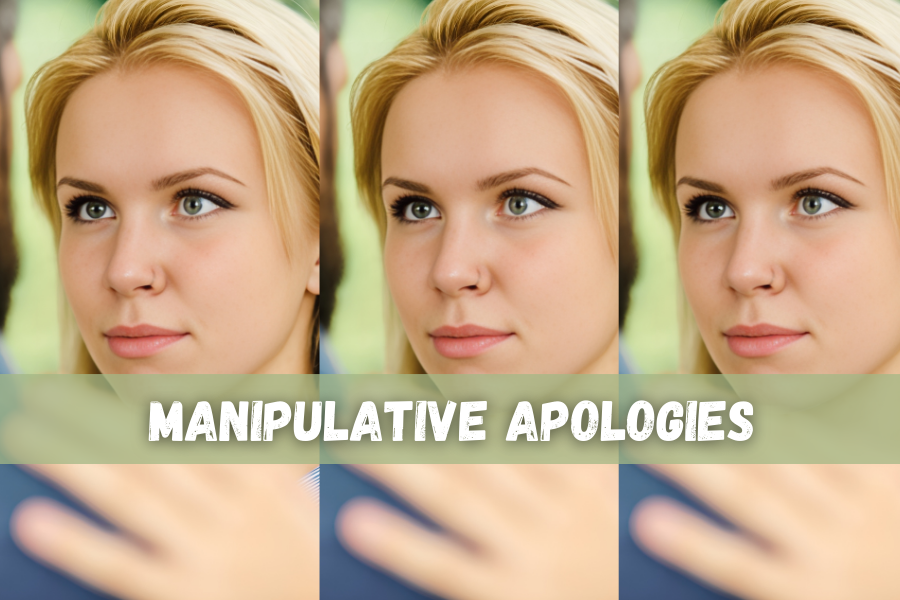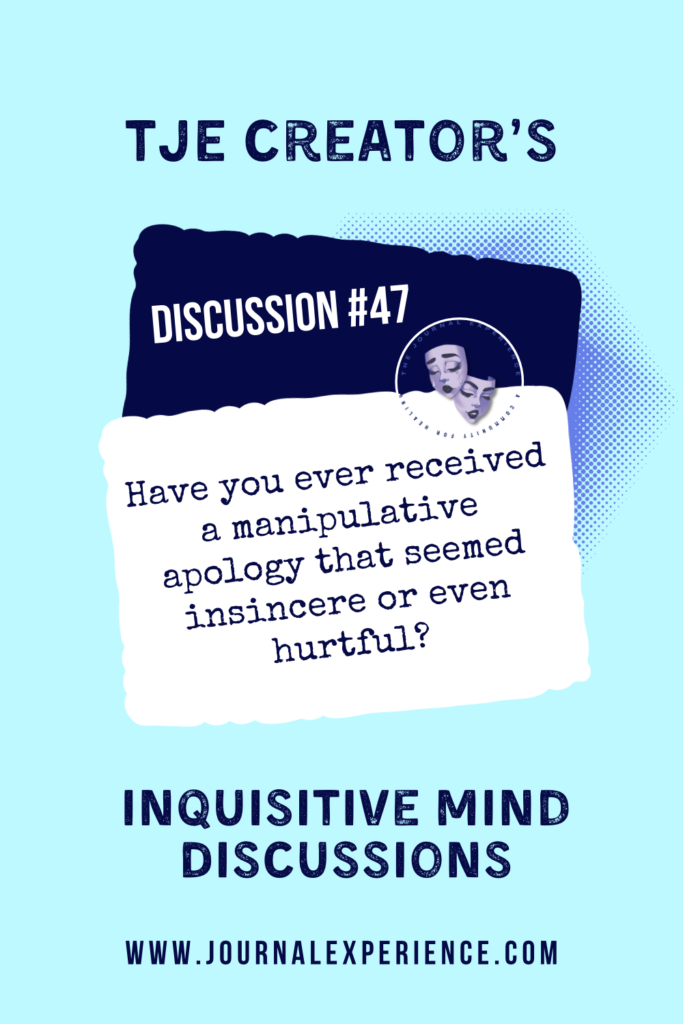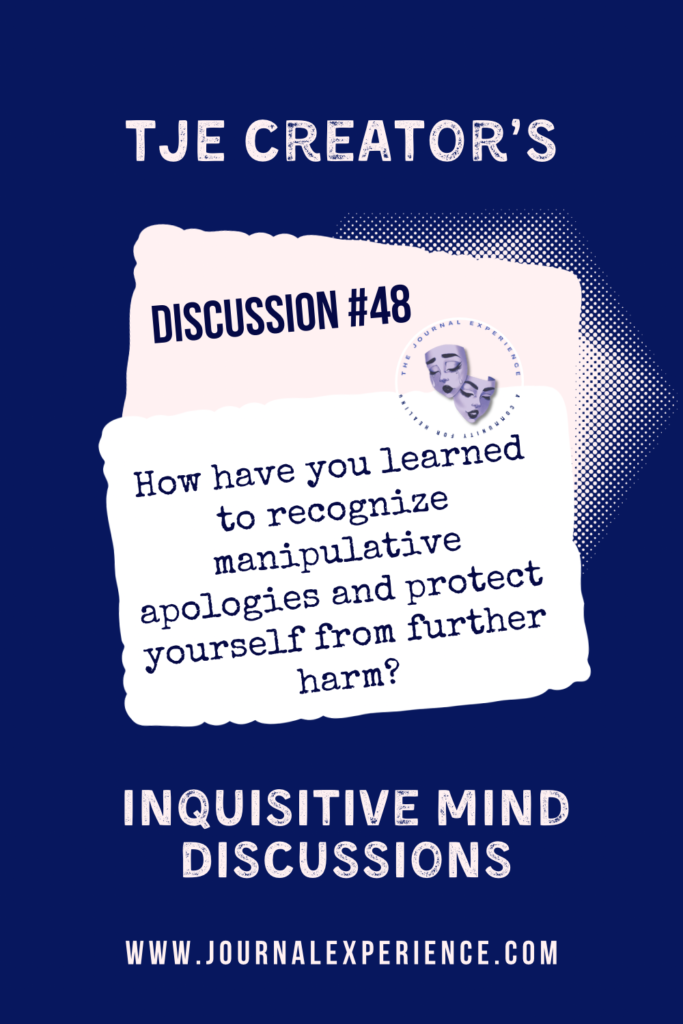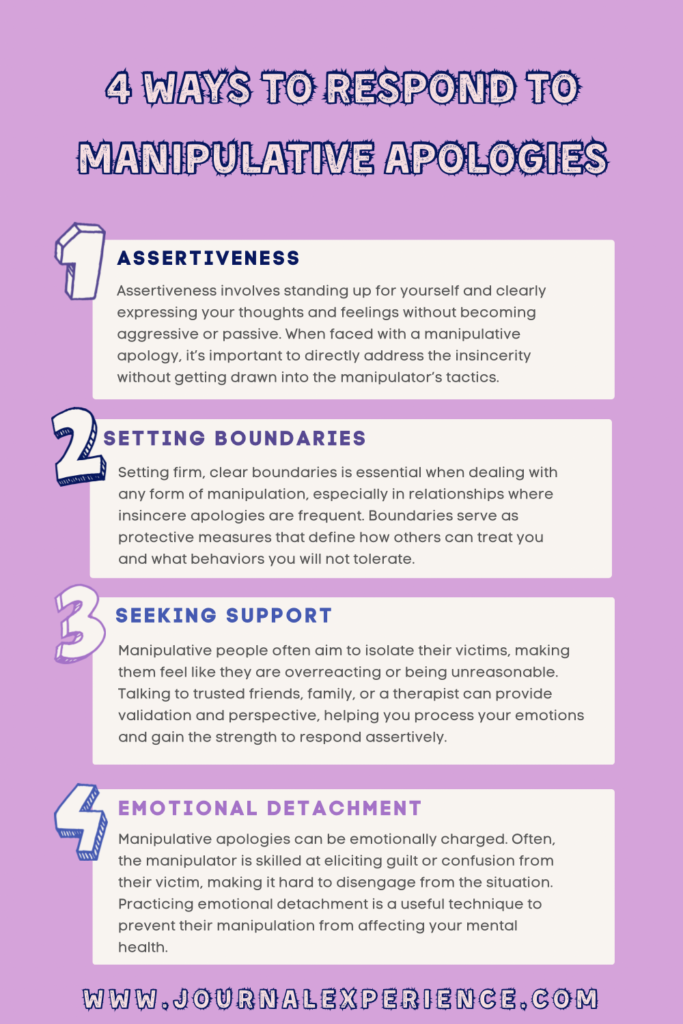Have you ever received an apology that just didn’t feel right? Perhaps the words sounded correct, but the sincerity was lacking, or you walked away feeling confused or worse than before. Manipulative apologies—a tactic used to control or diminish the other person’s feelings—can leave emotional scars and perpetuate unhealthy dynamics in relationships.

Unlike genuine remorse, which seeks healing, manipulative apologies are designed to shift blame, avoid accountability, or gaslight the recipient into doubting their own emotions.
These insincere expressions of remorse are common in toxic relationships and often leave the recipient feeling powerless.
Whether you’re navigating a romantic relationship, family dynamics, or friendships, recognizing these apologies is critical for setting healthy boundaries.
This post will explore the signs of manipulative apologies, their long-term impact on emotional health, and offer actionable strategies to respond assertively. We will also examine how manipulative behavior can manifest in children, providing insight into early interventions.
Signs of a Manipulative Apology
Manipulative apologies aren’t always easy to spot, as they often hide behind a veneer of politeness or concern. Here are some of the most common tactics used in manipulative apologies and how they can distort genuine reconciliation:
1. Lack of Sincerity
An insincere apology is often characterized by a lack of emotional engagement.
The person offering the apology might avoid eye contact, use a flat or monotone voice, or seem distracted. In these cases, their words are hollow, serving more as a formality than an actual expression of regret.
Example: “I’m sorry if you felt that way” places the burden of emotion on the recipient, making the apology feel dismissive rather than genuine.
2. Shifting Blame
Instead of taking full responsibility, a manipulative apologizer will shift the blame to someone or something else.
This tactic is meant to deflect attention away from their own wrongdoing and place the burden on external factors, or worse, on the victim.
Example: “I’m sorry, but if you hadn’t been so sensitive, this wouldn’t have happened” turns the apology into an accusation.
3. Conditional Apologies
A conditional apology often comes with strings attached. The person might apologize, but only on the condition that you meet certain demands or provide something in return—like immediate forgiveness or silence.
Example: “I’ll apologize, but only if you agree to never bring this up again” places a condition that benefits the manipulator rather than fostering resolution.
4. Gaslighting
Gaslighting is a form of manipulation where the individual tries to make the victim doubt their own feelings or perceptions. In manipulative apologies, gaslighting can make the recipient feel like they’re overreacting or misinterpreting the situation.
Example: “I’m sorry you’re so upset, but I think you’re exaggerating what happened” invalidates the victim’s emotions while offering a hollow apology.
5. Apologies that Minimize the Issue
A manipulative apology may also downplay the seriousness of the offense. By minimizing their actions, the person avoids taking full accountability, making the recipient feel as though they’re overreacting to a minor issue.
Example: “I said I was sorry—it’s not a big deal” undermines the emotional weight of the situation and dismisses the feelings of the other person.
6. Vague or Non-Specific Apologies
Another sign of manipulation is vagueness. When someone offers a non-specific apology without acknowledging what they did wrong, it becomes clear that they aren’t fully accepting responsibility for their actions.
Example: “I’m sorry for whatever I did” avoids confronting the issue head-on and allows the manipulator to sidestep genuine accountability.
7. The “I’m Sorry You Feel That Way” Apology
This is one of the most common forms of manipulative apology. By focusing on how the victim feels, rather than acknowledging the manipulator’s actions, the person offering the apology avoids taking any responsibility.
Example: “I’m sorry you took it that way” subtly shifts the blame to the recipient for interpreting the situation incorrectly.

The Impact of Manipulative Apologies
The emotional fallout from manipulative apologies can be devastating. These apologies are not about healing or fostering genuine connection but rather about maintaining control. Over time, they can deeply affect a person’s mental health and sense of self-worth.
Continued Emotional Abuse
Manipulative apologies keep the victim in a cycle of emotional abuse. By offering false reconciliation, the manipulator prevents the victim from taking a stand or seeking real closure. This tactic allows the cycle of hurt to continue without any real resolution.
Impact: The victim may feel like they are trapped, constantly waiting for things to improve, only to be let down repeatedly.
Difficulty Setting Boundaries
Victims of manipulative apologies often struggle to set and enforce boundaries because they are conditioned to doubt their own feelings. Each insincere apology erodes their confidence, making it harder to assert their needs in the relationship.
Impact: Over time, individuals may become increasingly dependent on the manipulator’s approval, even though it comes at the cost of their emotional well-being.
Reduced Self-Esteem
When someone constantly gaslights you or deflects blame, it’s easy to start questioning your own reality. Over time, these experiences can cause significant damage to your self-esteem. You may begin to internalize the manipulator’s accusations, feeling that you’re overly sensitive, demanding, or unreasonable.
Impact: Individuals often report feeling powerless and diminished after repeated manipulative apologies, contributing to a decline in overall mental health.
If manipulative apologies have left you questioning your worth or suppressing your emotions, the Healing The Inner Trauma Child (HITCH) Method offers a transformative path to rebuild self-trust, reclaim emotional safety, and heal inner wounds at their root.

How to Respond to Manipulative Apologies
Dealing with manipulative apologies requires both emotional resilience and strategic communication. While these apologies may seem harmless on the surface, their underlying intent can leave you feeling confused, invalidated, or even trapped in a cycle of emotional manipulation. The key to responding effectively is to protect your emotional well-being by setting clear boundaries and asserting your needs. Below are several strategies to help you navigate these interactions and regain control over your emotional health.
1. Assertiveness
One of the most important skills when confronting manipulative behavior is assertiveness. Assertiveness involves standing up for yourself and clearly expressing your thoughts and feelings without becoming aggressive or passive. When faced with a manipulative apology, it’s important to directly address the insincerity without getting drawn into the manipulator’s tactics.
- Directly Acknowledge the Manipulation: Call out the manipulation for what it is. Let the person know that you recognize their behavior and that it is not acceptable. For example, if someone apologizes but shifts the blame onto you, say, “I hear your apology, but I don’t appreciate how you’re making this about me when your actions were the issue.”
- Clarify What You Need: Be specific about what you expect from a sincere apology. You might say, “What I need is an apology that takes full responsibility, without deflecting blame or minimizing what happened.”
- Stay Calm and Composed: Maintaining composure is key. A manipulator may try to provoke you emotionally, but staying calm and collected reinforces your control over the situation. Assertiveness is most effective when delivered with a steady tone and clear message.
Assertiveness is not about proving the other person wrong; it’s about protecting your own mental and emotional health. By being clear and direct, you shift the power dynamic, making it harder for the manipulator to continue their tactics.
2. Setting Boundaries
Setting firm, clear boundaries is essential when dealing with any form of manipulation, especially in relationships where insincere apologies are frequent. Boundaries serve as protective measures that define how others can treat you and what behaviors you will not tolerate.
- Define Your Limits: Before setting boundaries, it’s important to first clarify for yourself what behaviors are unacceptable. Ask yourself what kind of treatment you are willing to accept and where you draw the line. For example, if you’ve noticed a pattern of conditional apologies, you can set a boundary by saying, “I won’t accept apologies that come with strings attached. If you’re not genuinely sorry, I don’t want to continue this conversation.”
- Communicate Boundaries Clearly: Once you’ve defined your limits, communicate them to the other person in a calm and respectful way. State your boundaries without apology or justification. For instance, you might say, “I need to take some space for a few days because I feel like this conversation isn’t being approached with sincerity.”
- Enforce Consequences: Setting boundaries means nothing if there are no consequences when they’re violated. Be prepared to follow through if the other person disregards your limits. This may include limiting communication, taking a break from the relationship, or even ending the relationship if the manipulation persists. For example, you could say, “If you continue to use apologies to manipulate me, I will have to step back from this relationship to protect myself.”
By establishing clear boundaries, you protect your emotional well-being and send a strong message that manipulation will not be tolerated.
3. Seeking Support
One of the most effective ways to cope with manipulative apologies is to seek external support. Manipulative people often aim to isolate their victims, making them feel like they are overreacting or being unreasonable. Talking to trusted friends, family, or a therapist can provide validation and perspective, helping you process your emotions and gain the strength to respond assertively.
- Lean on Trusted Friends and Family: Share your experiences with people you trust. These are the individuals who can offer you emotional support and a reality check when you start to doubt your own perceptions. For example, you might say, “I’m dealing with someone who apologizes but makes me feel like I’m the problem. Am I overreacting?”
- Therapy and Professional Guidance: Sometimes, navigating manipulative behavior can feel overwhelming, especially if it’s part of a longstanding relationship pattern. Seeking the guidance of a licensed therapist can provide you with tools to set stronger boundaries and deal with emotional manipulation. Therapy can help you unpack how these manipulative interactions affect your self-esteem and mental health, offering strategies to protect yourself. For example, a therapist might work with you to practice assertiveness techniques or explore why certain patterns of behavior trigger specific emotional responses in you.
- Join Support Groups: If the manipulative relationship you’re dealing with is particularly toxic, such as in cases of narcissistic abuse or emotional neglect, joining a support group can provide solace. There’s strength in community, and hearing from others who’ve faced similar challenges can help validate your experiences and provide insights into how they overcame similar struggles.
If you’ve been trapped in cycles of manipulative apologies and emotional imbalance, the Codependency Therapy | Self Love Recovery Treatment Program provides expert-guided steps to break free from codependent patterns and reclaim your emotional autonomy.
4. Emotional Detachment
Manipulative apologies can be emotionally charged. Often, the manipulator is skilled at eliciting guilt or confusion from their victim, making it hard to disengage from the situation. Practicing emotional detachment is a useful technique to prevent their manipulation from affecting your mental health.
- Keep Conversations Objective: Instead of getting swept up in the emotional weight of the apology, try to view the situation objectively. Focus on the facts rather than how the apology makes you feel. For example, if someone says, “I’m sorry you feel that way,” remind yourself that this is not a genuine apology. It’s a tactic to make you question your feelings, and by staying detached, you can see it for what it is.
- Don’t Expect Closure from the Manipulator: One of the hardest truths about dealing with manipulative apologies is realizing that you may never get the genuine apology you deserve. Accepting this can help you emotionally detach from the need for closure. The apology may never come, but that doesn’t diminish your right to move forward and heal on your own terms.
- Focus on Your Emotional Recovery: Rather than seeking validation or reconciliation from the person offering the manipulative apology, focus on your own healing process. You can control how you process the interaction, even if you cannot control the behavior of the manipulator. Emotional detachment allows you to prioritize your well-being and mental health over trying to “fix” the other person or the relationship.
Overview
Manipulative apologies are a form of emotional abuse that can deeply affect a person’s mental and emotional well-being. These false expressions of remorse are designed to deflect blame, gaslight the victim, or maintain control over a relationship. Recognizing these tactics is the first step in protecting yourself from further harm. By responding assertively, setting clear boundaries, and seeking external support, you can regain your sense of self-worth and safeguard your emotional health.
Manipulative behavior can also begin in childhood, so it’s crucial to address these tendencies early on. Whether you’re experiencing manipulation in a personal relationship or seeing it in children, awareness and action are key to stopping the cycle.

Understanding the roots of manipulative dynamics can be life-changing. The Webinar: Origins of Codependency and Pathological Narcissism provides deep insight into how manipulative behaviors form—and how you can break the cycle for good.
If you’re navigating manipulative apologies, remember that you don’t have to go through it alone. Seek help from friends, family, or professionals to regain clarity and strength. You can also join “The Journal Experience” and connect with a supportive community of individuals who understand the impact of toxic relationships and manipulative behavior. Let’s build a brighter, more respectful future, one connection at a time.